We call it monosodium glutamate or just sodium glutamate. The Japanese invented (found it in nature actually) and call it umami, for "good flavor" or "good taste."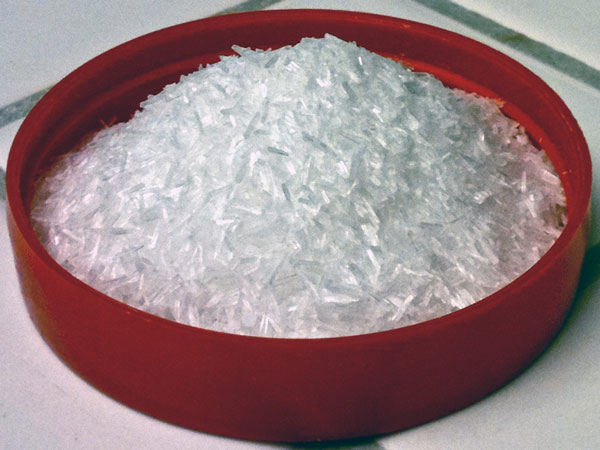
Many people have problems with consuming monosodium glutamate, or MSG, in their foods. Chinese cuisine and many other restaurant foods are notorious for having lots of MSG in them. Restaurant pho is no different. In fact MSG use in many pho restaurants is so prominent and unmistakable that you can literally taste it instead of the flavorful pho broth that it should be. While MSG exists naturally around us and its use is considered "safe" by the Food and Drug Administration (FDA,) the benefits or ill effects that it brings to human diners (and pho zealots!) remain quite controversial. We each have our own judgement, tolerance, and reaction to MSG but to get a broader understanding of its impact on our culinary experience, I've asked a few culinary industry masters to share their views on MSG and how they feel it should be used in our daily lives.
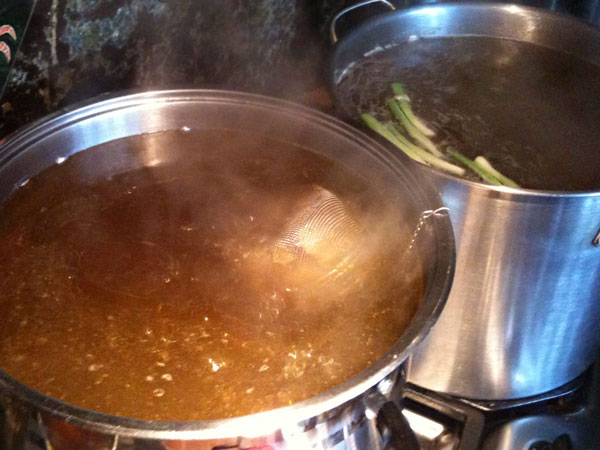 Here are some views on monosodium glutamate from 7 food industry experts. Five of them have extensive culinary experience in Asian foods, the other 2 brings to the "table" (no pun intended) a clear Western viewpoints of MSG use. At least one is a food scientist, and many are respected authors, educators and publishers in their own right. I point this out because, in my opinion, the discussion on MSG cannot omit the differentiation between western and eastern cooking philosophies. In fact, such differences may just explain why MSG receives such notoriety sometimes.
Here are some views on monosodium glutamate from 7 food industry experts. Five of them have extensive culinary experience in Asian foods, the other 2 brings to the "table" (no pun intended) a clear Western viewpoints of MSG use. At least one is a food scientist, and many are respected authors, educators and publishers in their own right. I point this out because, in my opinion, the discussion on MSG cannot omit the differentiation between western and eastern cooking philosophies. In fact, such differences may just explain why MSG receives such notoriety sometimes.
In alphabetical order, they are:
- Donna Bauck, Associate Director of Retail for the University of Montana, Missoula
- Chef & culinary adventurer Robert Danhi, ChefDanhi.com.
- Author & Teacher Andrea Nguyen, VietWorldKitchen.com.
- Pho & coffee master Brian Nguyen, Quoc Viet Foods.
- Sinful recipes with Florentina, Peace, Love & Food! ciaoflorentina.com.
- Sushi, restaurant & marketing consultant Jay Terauchi chef_jay on Instagram.
- Author & Asian cuisine expert Corrine Trang, CorinneTrang.com.
I hope you will find their comments and viewpoints interesting and educational as I did. We are all humans and have our own biases and personal preferences, but insights from professionals in their own fields like these on a semi-controversial subject like MSG is a worthwhile read and definitely a learning experience. You will find both extreme and more moderate points of view on this thing we call MSG or umami. My own notes or clarification, if any, are added in brackets [...] to the end of the experts' individual statements.
1. What are your views on MSG and its use in food preparation in general? Was its creation a blessing or curse to the culinary world?
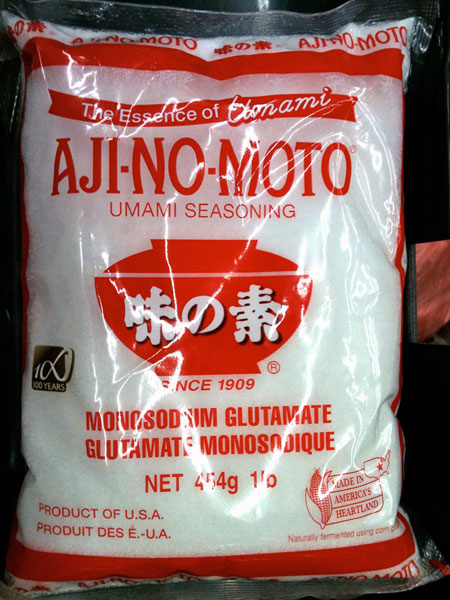 Donna Bauck. Both a blessing AND a curse. As we all know many people are sensitive to it. In the “corporate” food world it is often banned. Corporations spend a great deal of time and money finding other ways to boost flavor, and I know some products are no longer used because they contain it. On the other hand, we all want to honor traditions AND cultures. In the case of “America” we have often taken too many liberties in Americanizing foods. In the food industry, many of us realize we have lost the heart, soul, and flavor of many cultures' foods by doing this. What is the answer? I don’t think anyone has come up with a good one. [I think Ms. Bauck's latter point is that, in americanizing ethnic foods, we make changes to them (including taking out MSG) to the detrimental effect of the foods' authenticity and taste, which I totally agree with.]
Donna Bauck. Both a blessing AND a curse. As we all know many people are sensitive to it. In the “corporate” food world it is often banned. Corporations spend a great deal of time and money finding other ways to boost flavor, and I know some products are no longer used because they contain it. On the other hand, we all want to honor traditions AND cultures. In the case of “America” we have often taken too many liberties in Americanizing foods. In the food industry, many of us realize we have lost the heart, soul, and flavor of many cultures' foods by doing this. What is the answer? I don’t think anyone has come up with a good one. [I think Ms. Bauck's latter point is that, in americanizing ethnic foods, we make changes to them (including taking out MSG) to the detrimental effect of the foods' authenticity and taste, which I totally agree with.]
Robert Danhi. Chef Danhi wrote passionately and extensively about the subject of MSG in his book Southeast Asian Flavors. With his permission, I'm quoting relevant paragraphs here.
... For years I’ve had an internal battle over whether to use monosodium glutamate (MSG) in my cooking. The struggle began more than a decade ago when I really began to understand Southeast Asian food. I avoided using it, since as a classically trained Western chef, I was taught it was cheating and unnecessary to achieve really good food (actually true). But the challenge is that the food I’ve loved so much when I’ve traveled tasted so different from what I would make in my kitchen stateside. I realized there was no question that the prevalent use of MSG in restaurants and by street vendors of Southeast Asia was a significant factor affecting the flavor. I have ventured into hundreds of kitchens in Southeast Asia over the past twenty years. Most use MSG in one form or another. I have decided to address what most cookbook authors avoid—the topic of monosodium glutamate...
... I do not recommend nor disapprove of its use. The reality is that a majority of the kitchens in Southeast Asia use it. In the U.S.A. “No MSG added” is a common restaurant claim. But while the cooks may not have added MSG in its pure form, they probably still use sauces that have it added at the factory. Many cooks exclaim they do not use MSG, but frankly many do not even realize that they do...
... I believe much of the modern-day use of MSG in the foods around Southeast Asia is a cost-cutting measure... ... That stated, MSG is a relative newcomer to Asian cookery, having been in use for just over one hundred years. Although I was not around two hundred years ago, I’m sure there were amazing, vibrant, flavorful foods long before MSG’s invention...
Andrea Nguyen. MSG is not a terrible thing but it’s [oftentimes] [overused] to make blah, poorly made food tasty. Umami is important in lots of Asian cooking but there are natural ways to achieve it. MSG is a chemical product. Who wants to add extra chemicals to their food? It’s not natural.
Brian Nguyen. MSG is a flavor enhancer. Until today, FDA and most, if not all, health officials from other countries have not banned of using MSG in foods. The chemical components of MSG are Sodium and Glutamic Acid. Glutamic Acid is an Amino Acid. Our body requires Amino Acid. However, our body can produce it, luckily. Without it, our foods would be very bland.
Florentina. MSG is simply not good for you. It might have been a blessing for the culinary world, but definitely a curse for me and you, the consumer.
Jay Terauchi. I don't use MSG in my cooking, unless it's an Asian packaged or canned product. I understand having to use it in processed foods, but I won't use it as a flavor enhancer.
Corinne Trang. In my Asian side of the family, we used it all the time. Some still do, but I don’t. It is unnecessary. Salt can open up your taste buds. Spices and herbs can enhance any foods, curing, heat cooking, etc... can do the same. There [are] so many ways to create beautiful flavors with fresh ingredients, why would anyone want to use MSG? It’s definitely a curse, and quite frankly it should be taken off the market.
2. How much, if any, do you use or recommend the use of MSG in any recipe?
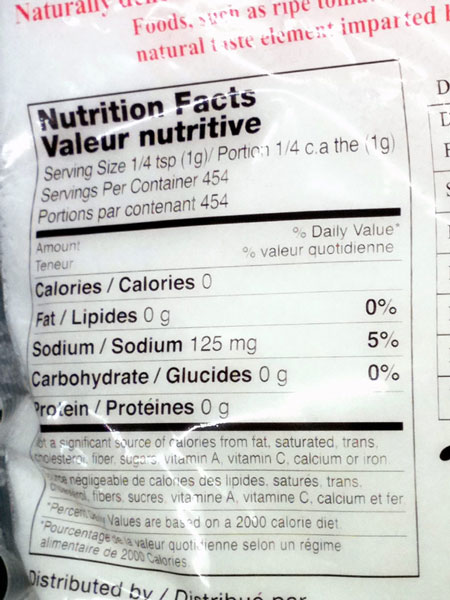 Donna Bauck. I stay away from it as much as possible. There is no way of knowing if my customer base has sensitivity. Though I attempt to label any foods that I am aware of (just as you would for nuts,) I believe there is a growing population that does know if they are sensitive, [therefore] may steer away from foods labeled as such.
Donna Bauck. I stay away from it as much as possible. There is no way of knowing if my customer base has sensitivity. Though I attempt to label any foods that I am aware of (just as you would for nuts,) I believe there is a growing population that does know if they are sensitive, [therefore] may steer away from foods labeled as such.
Robert Danhi. Don't use in recipes.
Andrea Nguyen. I don’t suggest using MSG in any of my recipes. I’m more intrigued by what natural glutamates do in food, how they make food taste good.
Brian Nguyen. Most food products contain naturally occured Glutamic Acid. However, during the cooking process, most of Glutamic Acid is destroyed by heat from over cooking. The amount of putting the MSG back into food varies. However, it should be much less than 1% in finished products.
Florentina. I do not use MSG in my cooking and I would never recommend it in a recipe.
Jay Terauchi. None.
Corinne Trang. Zero.
3. Are there certain dishes that you feel will always need at least some MSG?
Donna Bauck. I do not believe I am in the position to answer this. I do not use it, though I am sure I have eaten it. I have never studied the effects of a recipe with or without MSG.
Robert Danhi. [No.]
Andrea Nguyen. Nope. Some Viet people say that pho is not pho without MSG but that’s just because there is rampant use of it in pho. They are used to the ‘sweet’ flavor that MSG lends. Using yellow rock sugar makes that happen in pho broth.
Brian Nguyen. As I mentioned above, MSG is a flavor enhancer not a flavor. Most cooked dishes require MSG since it has been destroy[ed] by heat.
Florentina. Absolutely not. With all the spices we have available to us today, there is no need for MSG at all.
Jay Terauchi. I don't feel that but understand that most Asian dishes use it and that's what people know it to taste like that.
Corinne Trang. No.
4. With respect to pho, is MSG (at any quantity) an important ingredient? What about any other broths/soup dishes?
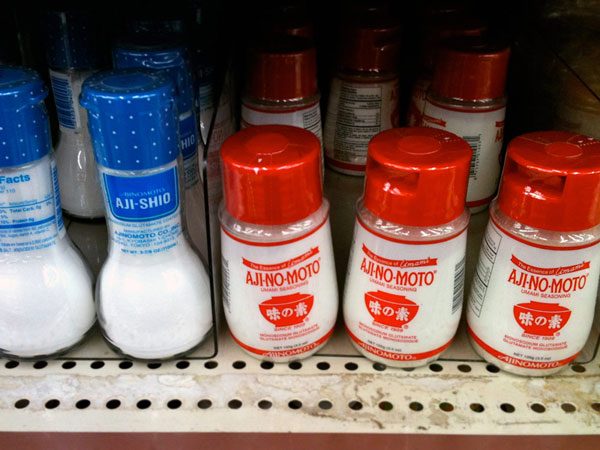 Donna Bauck. Same answer as above. Additionally, though I have eaten pho, I could not answer from a cultural, or personal experience as to its importance.
Donna Bauck. Same answer as above. Additionally, though I have eaten pho, I could not answer from a cultural, or personal experience as to its importance.
Robert Danhi. Use lots of meat, enough fish sauce and long simmering to harness umami and no MSG is needed. [If you] can't afford the meat and time, add some MSG and broth will taste better.
Andrea Nguyen. See response to #3 above.
Brian Nguyen. The most important ingredient in Pho or any dishes is not MSG. MSG is not a primary ingredient. It is a secondary ingredient. It is there to enhance not to act as a flavor.
Florentina. I don't believe so. More people should try using sea salt and lots of aromatics to enhance the flavor of their meals.
Jay Terauchi. I think to give it the authentic flavor YES, otherwise I think it would lack the familiar flavor that people know.
Corinne Trang. MSG is not necessary in any food, including pho or other broths or soup dishes. Again my family has used [it] for sure, but I don’t see a good enough reason to add it to any of my meals.
5. The bottom line: would you enjoy a bowl of pho (homemade or restaurant) knowing that MSG was used?
Donna Bauck. Since I have eaten pho, in traditional settings I believe I can safely assume I have eaten it with MSG. Though, again, I believe the public needs additional education on MSG. It is one of those products that we hear (as example) may cause headaches if you are sensitive to it. No one I know wants to “risk” a headache… so though they may have eaten MSG prior, they may not know they have. Theoretically, I believe some people would shy away from a food product with this ingredient because of this.
Robert Danhi. Yes, I do here in USA and in Vietnam where most cooks use it... Sad, but they [can't] afford the pure meat/bone broth.
Andrea Nguyen. When I have pho in a restaurant, most likely there’s MSG in the broth. That’s fine and expected. What’s not fine is when there’s a ton of MSG in the broth. That’s just bad cooking.
Brian Nguyen. Whether homemade or restaurant made, MSG should be used sparingly.
Florentina. Yes I would, occasionally, but if I were given the choice between a bowl of pho made with MSG and one made without the use of MSG I would pick the latter.
Jay Terauchi. I understand that it's traditional and enjoy the flavor from the stock of bones, etc. If the broth only had flavor from seasonings such as MSG, then No. It's a big selling point to Americans if you don't use MSG.
Corinne Trang. I would. I did when I was in Vietnam. I have when enjoying pho in a NY City’s Chinatown, because when in the company of friends, you talk about other things besides MSG! At home when I make pho, or any Asian soups, I never use it.
My take on MSG.
So there you have it. Certainly learned a lot myself. My own personal view on MSG is more moderate than many people's, and certainly more moderate than some of our culinary masters here. I myself do not get adverse effects after consuming moderate amounts of MSG, except for the normal thirstiness which comes with any sodium consumption anyway. I do agree that many food vendors overuse MSG and my level of enjoyment would drop like a brick; I don't like salt water and it's just a waste of my money actually. In any case I think the MSG controversy will continue on. What's the bottom line? I think it is this:
- MSG is not banned simply because it is not necessarily bad for many of us, but we do have our own choice of what we consider a quality and healthy diet. Education and understanding are key.
I want to send many warm thanks to Donna Bauck, Robert Danhi, Andrea Nguyen, Brian Nguyen, Florentina, Jay Terauchi and Corrine Trang for participating in this roundtable discussion on MSG. You gave us valuable insights into this tough culinary subject.
Now let's go eat some pho.
Oh and please take the MSG survey below.

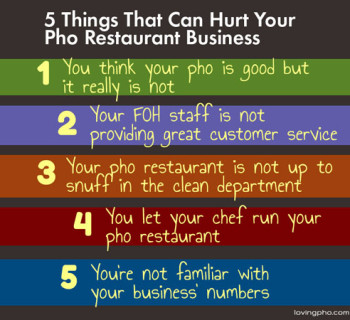

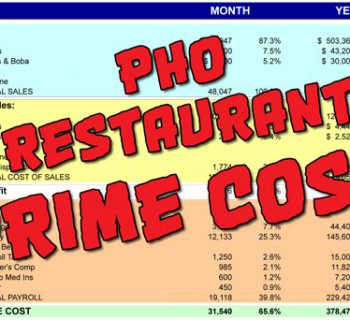
I’ll have to disagree with some of your guests. There hasn’t been any reliable scientific studies that would prove MSG as being bad for your heath. I’m sure there are some people who are sensitive to it, but the chemical composition is exactly as it occurs in nature. I don’t really see a difference between MSG and using salt of sugar which is chemically processed from nature as well.
Of course, there are some people who may have allergic reactions to it, but that’s like every other food.
My experience is that an asian restaurant that advertises “No MSG” usually aren’t very good.
Hi David: I agree with your viewpoints. Using MSG in your diet or not is a personal preference, and until proven scientifically otherwise, it is just getting a bad rap. As you can see from the interview, professionals in the industry do have strong feelings about MSG use.
I think the “No MSG” being used by restaurants is really a marketing ploy to attract new client segments, like “gluten-free” or “we use only vegetable oil.” These will come and go depending on what hot new wave they want to ride at a given time. And of course, without MSG, which is a flavor enhancer, restaurants have to find other ways to boost flavors, and depending on their knowledge on how to do this or maybe even being too cheap to spend more time and effort to give their foods more flavors, and the result is as you say. On the other hand, I’ve eaten some delicious foods with no MSG, so doing it right is the key.
Although this article’s intent was to get the unbiased opinions about MSG from these food industry experts, I do not feel that it did the job, authors like Andrea and Corinne would never be caught condoning or lending their support for the use of MSG. It just wouldn’t be appropriate considering their audience is the Western populace. Brian Nguyen on the other hand provides more sincere comments regarding it’s use because his profession is not reliant on a steadfast opposition about an ingredient viewed so “negatively” by mainstream society. Those who love “authentic” asian food and eat it a lot, but disavow MSG, are probably the ones prefer to eat out. That way they don’t have to feel the guilt of purposely putting in that scoop of MSG in their food.
Yes too much MSG is not good, so is too much sugar, salt, butter, lard… etc.
Hi Vu: This article was written to present different opinions, and not to present “unbiased opinions” as you described. In fact an opinion is always biased because it is its definition. I wrote “Here are some views on monosodium glutamate from 7 food industry experts … I point this out because, in my opinion, the discussion on MSG cannot omit the differentiation between western and eastern cooking philosophies. In fact, such differences may just explain why MSG receives such notoriety sometimes.”
I also answered peroki above with the following: “I personally think MSG does have its place in cooking. Like everything else, moderation is key. It is not reasonable to expect a diet with absolutely zero fat; a little ok. So the same goes with MSG. For those who say MSG is really bad for you, they are just stating their personal opinions.” It’s a touchy subject for some, but for me, I do have my own opinion as well, which I stated throughout the articles and replies to comments.
Your points about the the experts’ opinions is well taken and I agree with you completely. Brian Nguyen is knowledgeable and does give sincere personal views. He tells it like it is.
It is interesting that people believe what they want to when it comes to food. Although, food scientist in the 70’s acknowledged the head ache associated with MSG, neuroendocrinology has enlightened us further as to the real dangers. A preminent MD and research scientist Dr Russell Blaylock MD has provided extensive research on the excitotoxic effects of MSG, its cousin Aspartame and the myriad flavor enhancers the industry uses to enduce abnormal, addictive eating patters while their business associates in the medical, surgical model will sell you the treatments necessary after a lifetime of eating MSG laced products. Excitotoxicity is experienced by your neurons in response to a flood of glutamate and aspartic acids if they are not digested slowly in a whole food. What then happens is that neurons fire uncontrolably, dose dependent, until they exhaust and die. THIS IS A FORM OF ACUTE BRAIN DEATH. The effects are wide spread in the brain due to the fact that glutamate receptors are so common for neurotransmission that many maladies can arise from over consumption. Lou Gerighs Dx, Parkinsons like syndromes, migranes, blindness, glucoma, to name a few. If you care and would like a counter point to MSG is OK thinking, read some excepts from Excitotoxins The Taste That Kills to familiarize youself and protect your loved ones who may be unsavy to this discussion. Also what everyou do stay far far away from Nutrasweet, aspartame and its spin off chemicals if you value your health. Happy eating;>
Mike: Wow, I won’t even claim to have enough knowledge to understand or time to research in any depth what you wrote there to either agree or dispute, but I do sense that your point may be at one extreme end of the MSG spectrum. As far as I understand it, many international and national bodies for the safety of food additives consider MSG safe for human consumption as a flavor enhancer. I will leave your comment up for others to read and discuss.
“MSG is not banned simply because it is not necessarily bad for many of us, but we do have our own choice of what we consider a quality and healthy diet. Education and understanding are key.”
Seriously? It is funny that you say “it is not necessarily bad for many of us” and then go on to say that “education and understanding are key.” MSG is an neruotoxin (excitotoxin). It has been proven that it shrivels and kills brain cells in the hypothalamus. It does this by exciting the brain cells to fire uncontrollably until they die. It has been directly linked to many horrible things. I’m not trying to sound like a jerk, but if you truly did the research on MSG, you may have a different opinion.